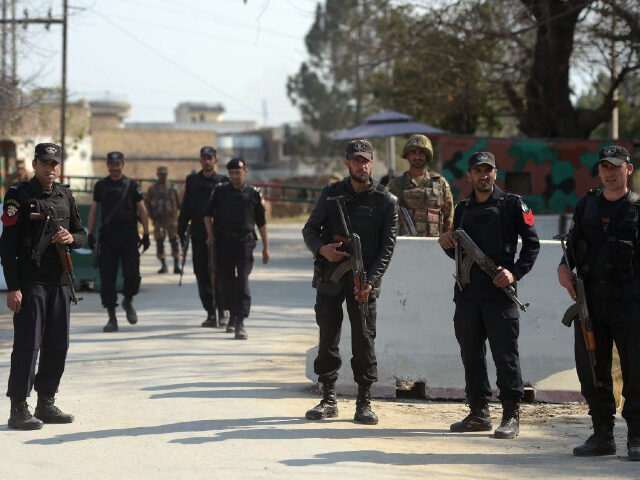A mob estimated to have attracted over 800 people stormed a police station in Punjab, Pakistan, this weekend, breached the building through a hole in the roof, and extracted a man arrested for allegedly committing blasphemy, beating him to death in public.
Harrowing images of the incident show the mob, consisting of Muslim men, using a ladder to climb up to a hole in the roof of the police station as dramatically outnumbered officers attempt to protect the police station’s front door. The victim of the lynching was identified as 45-year-old Muhammad Waris, who police had detained on Saturday on charges of “desecrating the Holy Quran.” The Pakistani newspaper Dawn, citing local police officers, described Waris as a serial victim of arrests on similar charges. Locals had accused Waris, who was going through a divorce, of engaging in “witchcraft” to curse his ex-wife and allegedly desecrating the Quran in the process.
Blasphemy against Islam is illegal in Pakistan, whose constitution declares the state an explicitly Islamic state. The Pakistani penal code punishes blasphemy in general but reserves the death penalty for insults against Muhammed, the prophet of the religion. Desecrating the Quran is punishable by life in prison. Pakistan keeps dozens of people, largely Christians, on death row for blasphemy despite minimal evidence against them, but has never executed anyone for blasphemy.
Yet many have been killed after being accused of the “crime.” While the state itself does not execute them, police often turn a blind eye to mob attacks against blasphemy suspects. In some cases, such as the lynching this weekend, the mobs so greatly outnumber police officers that pushing back the mob is too difficult.
According to the British Asian Christian Association, which advocates for victims of religious repression in Pakistan, Waris was accused of gluing images of himself and his ex-wife into a Quran, allegedly to engage in “witchcraft.” Waris had reportedly already spent about two years in prison on separate blasphemy charges, from 2019 to 2022, but authorities did not specify what crime he had allegedly committed during that incident.
The mob reportedly formed after mosques in the Punjab town where the incident occurred, Nankana Sahib, began using their megaphone systems to accuse Waris of blasphemy and call for men to organize and attack the alleged blasphemer. The British Asian Christian Association reported, citing police, that 50 officers were on duty at the police station housing Waris, while the crowd totaled over 800 men.
The officers appeared to successfully protect the front door of the building but it had recently been undergoing repairs and “their contractor had left a three-foot wide hole over the station’s main entrance gate,” the British Asian Christian Association narrated. “After climbing a ladder men were able to enter the station via the hole and unlocked the protective gates.”
Videos from the incident show the mob perching a ladder against the front of the building, climbing up to the roof, and eventually opening the front doors from the inside.
Total madness!!! An angry mob attacked the police station in Nankana Sahib. Reportedly an accused of blasphemy was killed and body burnt by the mob. Apparently police was unable to control the situation. pic.twitter.com/1kdNGFmqro
— Shiraz Hassan (@ShirazHassan) February 11, 2023
Graphic videos from the scene later show the mob drag the man out of the police station and beat him to death.
“The mob wanted to set the body on fire, but police intervened and managed to take the corpse away,” Dawn reported.
Police have reportedly only managed to arrest 60 of the over 800 people in the mob and local authorities suspended two senior officers over the incident. While mob attacks are common in Pakistan, the scale of this incident has led to nationwide embarrassment, leading Prime Minister Shehbaz Sharif to weigh in.
“Why didn’t the police stop the violent mob? The rule of law should be ensured,” the prime minister said in a statement.
Punjab is the epicenter of vigilante justice in the name of avenging anti-Islamic “blasphemy” in Pakistan. In 2011, a radical Islamist assassinated the province’s governor, Salman Taseer – a dramatic killing as the perpetrator worked as Taseer’s bodyguard. Taseer had previously called for reforming Pakistan’s blasphemy law and opposed the imposition of the death sentence on Asia Bibi, a Christian woman who spent eight years on death row for allegedly drinking water from a “Muslim” cup.
The execution of the man who assassinated Taseer, Mumtaz Qadri, prompted thousands of Muslim men to riot in 2017. That year, a mob of between 3,000 and 4,000 people surrounded Islamabad to protest Qadri receiving the death sentence for his killing of a top government official.
Punjab was also home to one of the most gruesome mob killings in recent memory in the country: the 2014 burning alive of Shehzad and Shamaa Bibi, two Christians accused of “blasphemy.” As in the case this week, mosques announced that the couple had desecrated a Quran and demanded local residents act. A mob dragged the young couple out of their homes and tortured them for two days before burning them alive in a kiln.
More recently, in February 2022, a mob of about 300 men stoned 41-year-old Mushtaq Ahmed to death in Punjab after a mosque employee claimed that Ahmed had burned a copy of the Quran. Ahmed was reportedly “mentally unstable” and known to behave erratically.

COMMENTS
Please let us know if you're having issues with commenting.